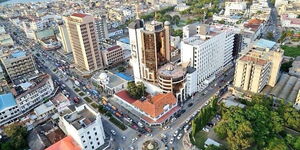The Ministry of Agriculture has announced that it will lease land to large-scale farmers who are willing to engage in extensive dairy feed production.
In a statement on Thursday, July 24, Agriculture Cabinet Secretary Mutahi Kagwe confirmed that the government will lease land to farmers willing to grow fodder and sunflowers, which are among the critical ingredients for sustainable dairy farming.
According to Kagwe, the move is among the key initiatives the government is implementing to address significant challenges, such as inadequate livestock feed, post-harvest losses, and climate change-related issues, that have long plagued dairy farming in the country.
"We must adopt practical and viable interventions to transform the dairy sector. We must synergize our efforts to increase production and productivity through the commercialization of pasture and fodder production," Kagwe said.
"The government intends to lease available arable public land for large-scale farming of fodder, sunflower, and other requisite ingredients that will bring down the cost of production to scale up dairy productivity," he added.
Furthermore, the ministry revealed that it is in the process of distributing and installing 230 milk coolers to dairy farmers across 40 counties in a bid to cushion farmers against losses. So far, 15 have been installed in Meru County and 8 in Nyeri County.
According to Kagwe, the coolers will be crucial in addressing the infrastructural challenges dairy farmers face, which have often resulted in poor milk storage, low milk quality, and low profits for farmers.
Each year, according to the ministry, the country loses an estimated 6 percent of marketed milk, which is about 175 million litres per year and worth about Ksh7.9 billion, due to post-harvest losses.
“Dairy farmers across the country play a significant role in contributing to the country’s milk basket," Kagwe said.
"Therefore, the supply of these milk coolers will not only boost storage but also improve milk quality, marketability, and ultimately farmer incomes, which is our primary goal. The 230milk coolers will increase national chilling capacity by 475,000 litres daily,” Kagwe said.
Kagwe further assured that the government will not backstep in pushing for livestock vaccination campaigns, which aim to eradicate pests and diseases, and the adoption of sexed semen, for high-quality animal breeds.
According to Kagwe, the Initiatives will not only be critical in scaling up the country's dairy productivity, but they will also create more jobs and reinforce the country's economic fitness, especially through agricultural exports.
"To achieve this, issues of productivity, inadequate breeding stocks and feeding, diseases and pests, poor infrastructure, post-harvest losses, and emerging challenges occasioned by climate change must be addressed efficiently to maximize the efforts," Kagwe said.












